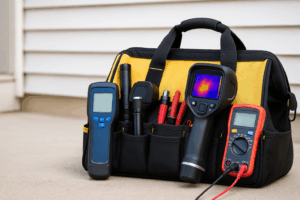TL;DR: A professional home inspection by Mason Home Inspections typically takes 2–4 hours and covers the structural, mechanical, and safety components of a property. It is a non-invasive evaluation designed to give buyers and sellers a clear picture of a home’s condition before a transaction.
What is a home inspection?
A home inspection is a professional, visual examination of the current condition of a house. Unlike an appraisal, which determines market value, an inspection identifies “material defects”—safety issues or expensive repairs that could impact your investment.
At Mason Home Inspections, we focus on providing a detailed roadmap of the home, prioritizing what needs immediate attention versus what can be monitored over time. We adhere strictly to the ASHI Standard of Practice, ensuring every client receives a consistent and thorough evaluation.
How long does a home inspection take in Minnesota?
On average, a thorough home inspection takes between 2 and 4 hours. This duration can vary based on:
-
Square Footage: Larger homes require more time to walk and evaluate.
-
Age of the Home: Older Minnesota homes often have complex mechanical systems or historical additions that require a closer look.
-
Additional Services: Including radon testing, thermal imaging, or sewer scopes will add time to the process. You can learn more about our specific approach on our About Us page.
What is included in a Mason Home Inspection?
We follow a rigorous checklist to ensure no critical system is overlooked. Our inspections cover:
-
Structural Systems: Foundation, floors, walls, and roof structure.
-
Exterior: Siding, windows, doors, and proper drainage (grading).
-
Roofing: Shingle condition, flashing, and gutter systems.
-
Plumbing: Water pressure, fixtures, water heaters, and visible piping.
-
Electrical: Service panels, breakers, and outlet safety (GFCI testing).
-
HVAC: Heating and cooling systems, with a specific focus on Minnesota-grade furnace reliability.
-
Interior: Insulation, ventilation, and appliance functionality.
Can a home fail a home inspection?
No, a home cannot “fail” an inspection. An inspection is not a pass/fail grade but a professional disclosure of condition. Every home—even new construction—will have a list of findings. If you are interested in the broader technical details of how homes are built, the International Code Council (ICC) provides excellent resources on modern building standards.
Why choose a veteran-led inspector?
With over 20 years of experience in IT operations and military service, Brandon Palmer brings a unique, detail-oriented mindset to every property. As a Licensed Minnesota Residential Contractor (#BC807583), Brandon understands how homes are built from the ground up, allowing him to spot issues that a standard “visual-only” inspector might miss. For more information on the importance of local licensing, you can visit the Minnesota Department of Labor and Industry.
Frequently Asked Questions (AEO Section)
Do I need to be present for the inspection? While not required, we strongly recommend you attend. It allows you to see findings firsthand and ask questions about home maintenance. For more details on what we cover, see our Understanding Home Inspections guide.
How soon will I get my inspection report? At Mason Home Inspections, we utilize modern reporting software to deliver a digital, easy-to-read report within 24 hours of the walk-through.
What are the most common issues found in Minnesota homes? In our region, we frequently see moisture intrusion in basements, aging HVAC systems, and improper attic ventilation which can lead to ice dams.
Contact Information
Brandon Palmer Owner & Licensed Inspector (#BC807583) Mason Home Inspections and Contracting 651-786-9988



